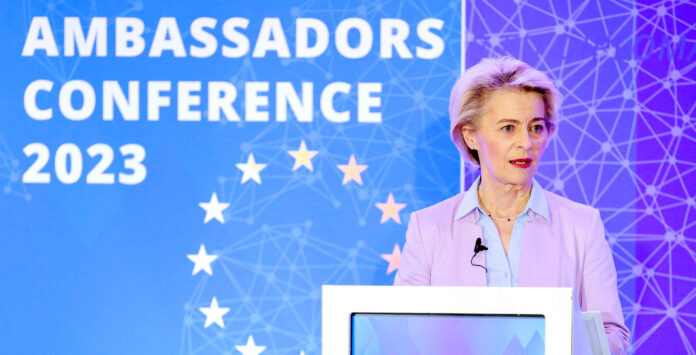European Commission President Ursula von der Leyen has outlined five “basic principles” to guide the future of the Gaza Strip once the war between Israel and Hamas ends.
The President of the European Commission, Ursula von der Leyen, sets out the fundamental principles that must be established to enable progress towards a two-state solution between Israel and the Palestinians.
These guidelines provide, among other things, for the end of Hamas’s control over Gaza and the lifting of the blockade imposed since 2007 by Israel and Egypt against the Palestinian enclave.
The European Union and the United States consider Hamas a terrorist organization and have no official contact with the group.
“Hamas has continued to strengthen its arsenal, while Gaza’s economy has collapsed, which goes against what we wanted. 70% of Gaza’s youth are unemployed. And this cannot lead to than greater radicalization,” explained the President of the European Commission on Monday in Brussels during the annual conference of EU ambassadors.
“Any future Palestinian state must be viable, including from an economic point of view.”
The five principles proposed by Ursula von der Leyen are:
Gaza must not be a haven for terrorists
Gaza must not be controlled by Hamas
no long-term Israeli security presence
no forced displacement of Palestinians
no lasting blockade of the Gaza Strip.
“All this may seem too ambitious, while the war is still raging,” recognizes the President of the Commission. “But we must not spare our efforts to maintain hope. We must find a lasting solution, based on two States living side by side in peace and security.”
Israel promised to “destroy” Hamas after the attacks on October 7 against the Jewish state which resulted in the deaths of more than 1,400 people.
Since then, the Israeli Defense Forces have bombarded the Gaza Strip, causing a serious humanitarian crisis. According to the Hamas-run Gaza Health Ministry, more than 9,700 people have been killed, including 4,800 children.
The European Union supports Israel’s right to self-defense “in accordance with international law” and calls for the establishment of “humanitarian corridors and pauses” to speed up the delivery of aid. emergency, such as food, water and fuel, in Gaza.
But this call, also taken up by Washington, has not succeeded in changing the situation on the ground and the number of civilian victims continues to increase.
“The humanitarian situation is disastrous. The number of deaths and the suffering of Palestinian civilians is tragic,” Ursula von der Leyen insisted on Monday. “Our hearts bleed at the sight of images of little children being pulled out from under the rubble.”
“If Israel has the right to fight Hamas, it is also essential that it strives to avoid civilian casualties and to be as targeted as possible,” she continued, “because every human life matters, regardless of whether she is Israeli or Palestinian.
The Commission President announced an additional €25 million in humanitarian aid for Gaza, bringing the total funding for this year to €100 million. She also said her institution was working on a “maritime corridor” from Cyprus to complete the Rafah crossing, the only route currently available to deliver emergency supplies.
This speech marks a change of tone on the part of Ursula von der Leyen, who was criticized in the first days of the conflict for having adopted a position considered too unilateral in favor of Israel. The speech reflects growing concern in the EU over the region’s rising death toll.
“The scale and scope of today’s events force us to act and think strategically. Even and especially when the fog of war is thick and emotions are running high,” German official explains to ambassadors , referring to the conflicts in Ukraine, the Caucasus and the Sahel.
Josep Borrell’s warning
Josep Borrell, head of EU diplomacy, was also present at the event and used his opening speech to share his thoughts on the war between Israel and Hamas. According to the Spanish official, this conflict is “the result of a collective political and moral failure” which dates back to the Oslo Accords of 1993, which never materialized.
“This is the last chance for a two-state solution. If we fail to achieve this, we will definitely be in a spiral of violence and mutual hatred for generations,” warns the EU diplomat.
According to Josep Borrell, the Israeli-Palestinian conflict should not be described as a “religious” or “ethnic” dispute, but as a national problem of “two peoples who have an equivalent right to exist on the same land” and who must find a way to share it.
“There is no military solution to the conflict without a political strategy, no one can win a battle against terrorism. We can crush people. But everywhere, we must look for political solutions,” he emphasizes. “Even if Hamas is uprooted in Gaza, that will not solve the problem of Gaza. It will not solve the problem of Gaza, much less the problem of the West Bank. So overreactions are always understandable, but they are never effective “.
Josep Borrell urges Israel “not to be blinded by rage” and warns that “ignoring the human costs could ultimately backfire on the country.”
The foreign policy chief then drew parallels between Israel’s war with Hamas and Russia’s invasion of Ukraine to warn that the European Union’s reaction to the former risked influencing its response to the second and to be perceived as a “contradiction” by the countries of the South.
“The two wars are different, completely different in their causes and their consequences. But let’s be frank, the crisis in the Middle East already has a lasting impact (on) our policy in Ukraine,” judges Josep Borrell.
“Our international support for Ukraine could erode in light of what is seen as a double standard.”
In a direct appeal to ambassadors, the Spanish official stresses that the EU should “never make the mistake of framing global issues in terms of the West versus the rest”, saying this would be “devastating” for the image of the Union in the world.
“We are not the outpost of the Western world,” he warns. “This is the alpha and omega of my message: we are the guardians of global and shared values based on the charter of the United Nations. Everywhere. At all times.”
This article is originally published on fr.euronews.com




